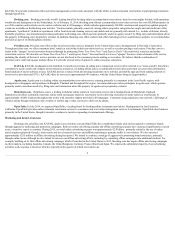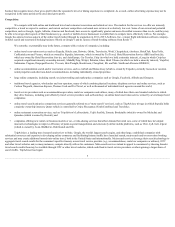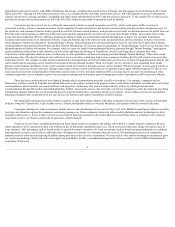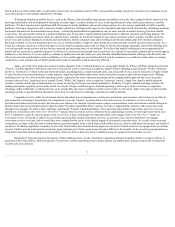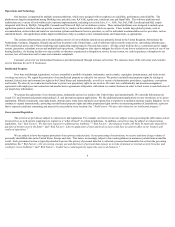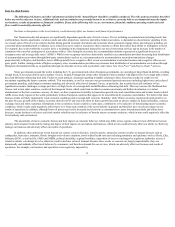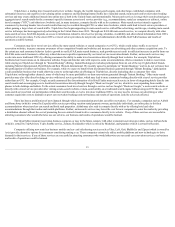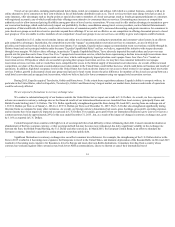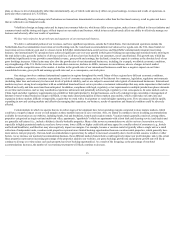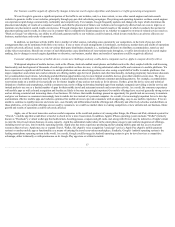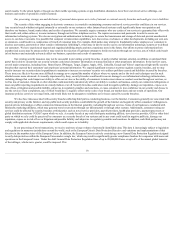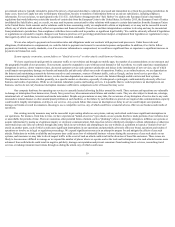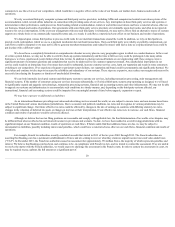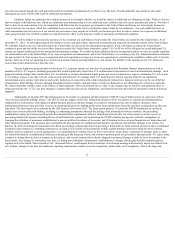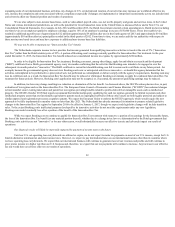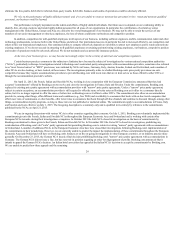Priceline 2015 Annual Report Download - page 17
Download and view the complete annual report
Please find page 17 of the 2015 Priceline annual report below. You can navigate through the pages in the report by either clicking on the pages listed below, or by using the keyword search tool below to find specific information within the annual report.
Travel service providers, including multi-national hotel chains, rental car companies and airlines with which we conduct business, compete with us in
online channels to drive consumers to their own websites in lieu of third-party distributors such as us. Travel service providers may charge lower prices and, in
some instances, offer advantages such as loyalty points or special discounts to members of closed user groups (such as loyalty program participants or consumers
with registered accounts), any of which could make their offerings more attractive to consumers than our services. Discounting may increase as competition
authorities seek to allow increased pricing flexibility among providers of travel service reservations. We may need to offer similar advantages to maintain or grow
our reservation bookings, which could adversely impact our profitability. Further, consolidation among travel service providers, such as Marriott International's
acquisition of Starwood Hotels & Resorts, could result in lower rates of commission paid to OTCs, increased discounting, and greater incentives for consumers to
join closed user groups as such travel service providers expand their offerings. If we are not as effective as our competitors in offering discounted prices to closed
user groups or if we are unable to entice members of our competitors' closed user groups to use our services, our ability to grow and compete could be harmed.
Competition in U.S. online travel remains intense and online travel companies are creating new promotions and consumer value features in an effort to
gain competitive advantages. In particular, the competition to provide "opaque" accommodation reservation services to consumers, an area in which our
priceline.com business has been a leader, has become more intense. For example, Expedia makes opaque accommodation room reservations available through its
Hotwire brand and on its principal website under the name "Expedia Unpublished Rates" and has, we believe, supported this initiative with steeper discounts
through lower margins. We believe these offerings, in particular "Expedia Unpublished Rates," have adversely impacted the market share and year-over-year
growth rate for priceline.com's Name Your Own Price ® opaque hotel reservation service, which has been experiencing a decline in room night reservations since
2011. Competitors could also launch opaque rental car services, which could negatively impact priceline.com's opaque Name Your Own Price ® rental car
reservation service. If Expedia or others are successful in growing their opaque reservation services, we may have less consumer demand for our opaque
reservation services over time, and we would face more competition for access to the limited supply of discounted reservation rates. As a result of this increased
competition, our share of the discount accommodation reservation market in the United States could further decrease, which could harm our business and results of
operations. In addition, high hotel occupancy levels in the United States have had an adverse impact on our access to hotel rooms for our opaque hotel reservation
services. Further, growth in discounted closed user group retail prices for hotel rooms lessens the price difference for members of the closed user group between a
retail hotel reservation and an opaque hotel reservation, which we believe has led to fewer consumers using our opaque hotel reservation services.
During 2015, Expedia acquired Travelocity, Orbitz and HomeAway. To the extent these acquisitions enhance Expedia's ability to compete with us, in
particular in the United States, which is Expedia's, Travelocity's, Orbitz's and HomeAway's largest market, our market share, business and results of operations
could be adversely affected.
We are exposed to fluctuations in currency exchange rates.
We conduct a substantial majority of our business outside the United States but we report our results in U.S. Dollars. As a result, we face exposure to
adverse movements in currency exchange rates as the financial results of our international businesses are translated from local currency (principally Euros and
British Pounds Sterling) into U.S. Dollars. The U.S. Dollar significantly strengthened against the Euro during 2014 and 2015, moving from an exchange rate of
1.38 U.S. Dollars per Euro as of January 1, 2014 to 1.09 U.S. Dollars per Euro as of December 31, 2015. The U.S. Dollar also strengthened significantly during
this time frame as compared to many other currencies. As a result, our foreign currency denominated net assets, gross bookings, gross profit, operating expenses
and net income have been negatively impacted as expressed in U.S. Dollars. For example, gross profit from our international businesses grew year-over-year on a
constant currency basis by approximately 28% for the year ended December 31, 2015 , but, as a result of the impact of changes in currency exchange rates, grew
by 11.6% as reported in U.S. Dollars.
Certain European Union countries with high levels of sovereign debt have had difficulty at times refinancing their debt. Concern around devaluation or
abandonment of the Euro common currency, or that sovereign default risk may become more widespread, has led to significant volatility in the exchange rate
between the Euro, the British Pound Sterling, the U.S. Dollar and other currencies. In March 2015, the European Central Bank, in an effort to stimulate the
European economy, launched a quantitative easing program to purchase public debt.
Significant fluctuations in currency exchange rates can affect consumer travel behavior. For example, the strengthening of the U.S. Dollar relative to the
Euro in 2015 resulted in it becoming more expensive for Europeans to travel to the United States, and dramatic depreciation of the Russian Ruble in 2014 and 2015
resulted in it becoming more expensive for Russians to travel to Europe and most other non-Ruble destinations. Consumers traveling from a country whose
currency has weakened against other currencies may book lower ADR accommodations, choose to shorten or cancel their international travel
14


